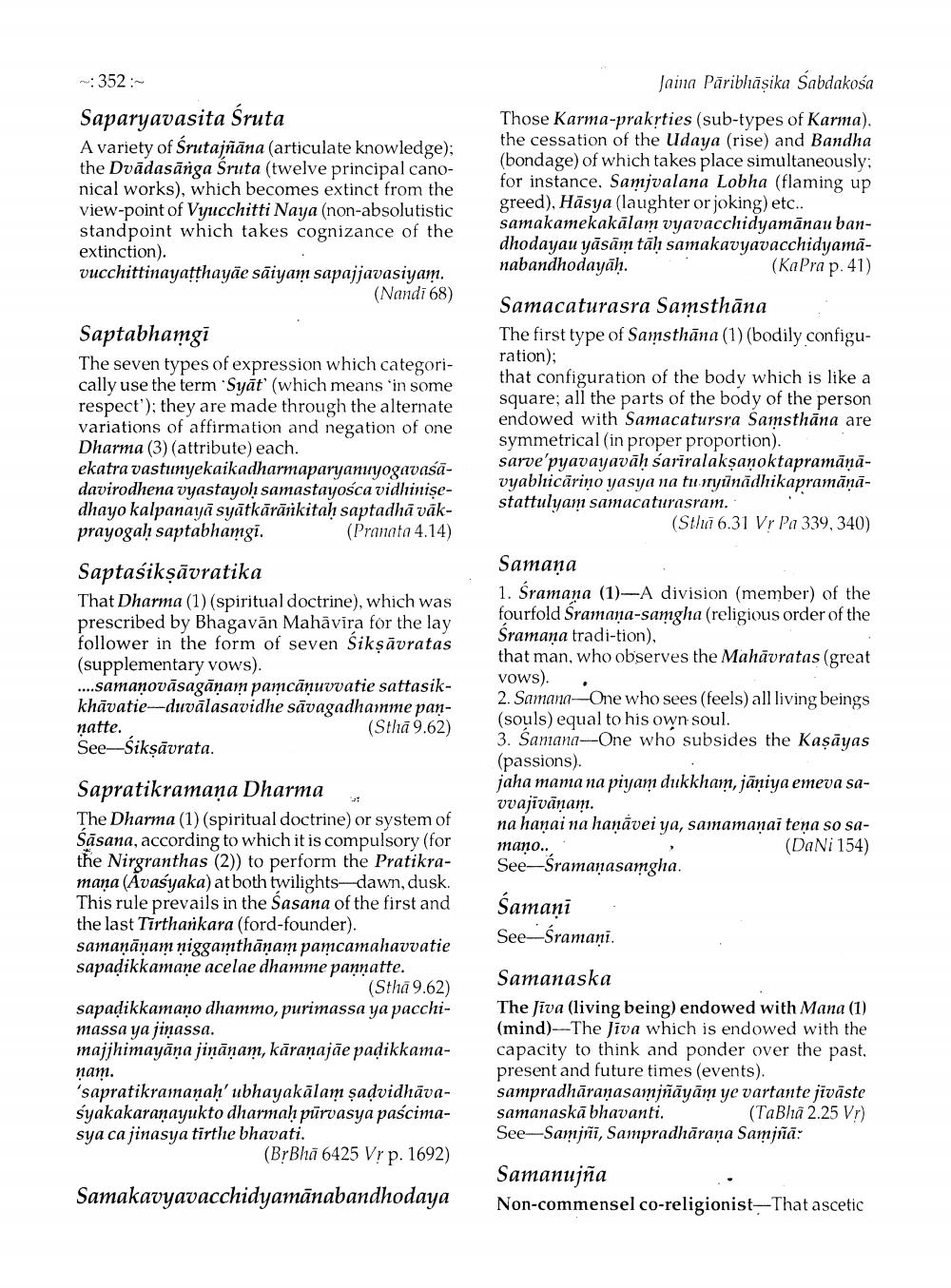________________
Jaina Pāribhāșika Sabdakosa
-: 352:Saparyavasita Śruta A variety of Śrutajñāna (articulate knowledge); the Dvādasārga Sruta (twelve principal canonical works), which becomes extinct from the view-point of Vyucchitti Naya (non-absolutistic standpoint which takes cognizance of the extinction). vucchittinayatthayāe sāiyam sapajjavasiyam.
(Nandi 68)
Those Karma-prakrties (sub-types of Karma). the cessation of the Udaya (rise) and Bandha (bondage) of which takes place simultaneously: for instance, Samjvalana Lobha (flaming up greed), Hāsya (laughter or joking) etc.. samakamekakālam vyavacchidyamānau bandhodayau yāsāın tāh samakavyavacchidyamānabandhodayāḥ.
(KaPra p.41)
Saptabhamgi The seven types of expression which categorically use the term 'Syāt' (which means 'in some respect'); they are made through the alternate variations of affirmation and negation of one Dharma (3) (attribute) each. ekatra vastunyekaikadharmaparyanuyogavasādavirodhena vyastayoh samastayońca vidliinisedhayo kalpanayā syātkārārikitah saptadhā vākprayogah saptabhamgi. (Pranata 4.14)
Samacaturasra Samsthāna The first type of Samsthāna (1) (bodily configuration); that configuration of the body which is like a square; all the parts of the body of the person endowed with Samacatursra Samsthāna are symmetrical (in proper proportion). sarve'pyavayavāḥ sariralaksaņoktapramāṇāvyabhicāriņo yasya na tu nyünādhikapramāņāstattulyam samacaturasram.
(Sthn 6.31 Vr Pa 339,340)
Saptasikşāvratika That Dharma (1) (spiritual doctrine), which was prescribed by Bhagavān Mahāvira for the lay follower in the form of seven Śikṣāvratas (supplementary vows). ....samanovāsagānam pamcānuvvatie sattasikkhāvatie-duvālasavidhe sāvagadhamme pannatte.
(Sthā 9.62) See—Sikşāvrata.
Samana 1. Sramana (1)-A division (member) of the fourfold Sramaņa-samgha (religious order of the Sramana tradi-tion), that man, who observes the Mahāvratas (great vows). . 2. Samana-One who sees (feels) all living beings (souls) equal to his own soul. 3. Samana-One who subsides the Kaşayas (passions). jaha mama na piyam dukkham, jāņiya emeva savvajīvānam. na haņai na hanīvei ya, samamanai tena so samano..
(DaNi 154) See-śramanasamgha.
Samani See-śramaņi.
Sapratikramana Dharma The Dharma (1) (spiritual doctrine) or system of Sāsana, according to which it is compulsory (for the Nirgranthas (2)) to perform the Pratikramaņa (Āvasyaka) at both twilights-dawn, dusk. This rule prevails in the Sasana of the first and the last Tirtharikara (ford-founder). samaņānam niggamthāņam pamcamahavvatie sapadikkamane acelae dhamme pannatte.
(Stha 9.62) sapadikkamano dhammo, purimassa ya pacchimassa ya jinassa. majjhimayāņa jiņāņam, kāraṇajāe padikkamaпат. 'sapratikramanah' ubhayakālam sadvidhāvasyakakaramayukto dharmaḥ pūrvasya pascimasya ca jinasya tirthe bhavati.
(BrBhā 6425 Vp. 1692)
Samanaska The Jiva (living being) endowed with Mana (1) (mind)--The Jiva which is endowed with the capacity to think and ponder over the past, present and future times (events). sampradhāraṇasamjñāyām ye vartante jīvāste samanaskā bhavanti.
(TaBhā 2.25 Vr) See--Samjni, Sampradhārana Samjñā:
Samakavyavacchidyamānabandhodaya
Samanujña Non-commensel co-religionist-That ascetic




